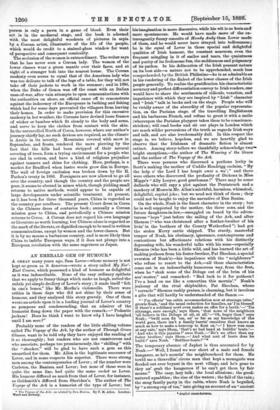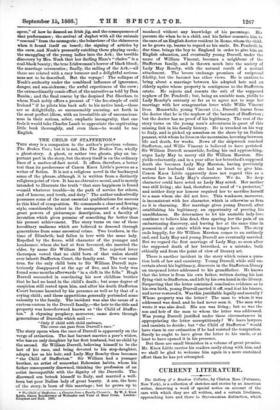AN EMERALD GEM OF HITMO1TR.*
A GREAT many years ago, Sam Lover—whose memory is not kept so green as it deserves—wrote a story called My Nor'- East Course, which possessed a kind of humour as delightful as it was indescribable. None of the easy ordinary epithets that we apply to funny things which make us laugh, suited the subtle yet simple drollery of Lover's story ; it made itself " felt in one's bones," like Mr. Morfan's violoncello. There were critics in those days who did not shine by their sense of humour, and they analysed this story gravely. One of them wrote an article upon it in a leading journal of Lover's country so pompons and condescending, that an admirer of the humorist flung down the paper with the remark,—" Pedantic jackass ! Does he think I want to know why I have laughed. until I am sore ?"
Probably none of the readers of the little shilling volume called The Voyage of the Ark, by the author of Through Green Glasses, want to be told why they have enjoyed the reading of it so thoroughly; but readers who are not omnivorous and who associate, perhaps too promiscuously, the " " with the " shocker," will be glad to have such a gem as this unearthed for them. Mr. Allen is the legitimate successor of Lover, and in some respects his superior. There were strong men among the contemporaries of Lover ; of the number were Carleton, the Banims, and Lever; but none of these were in quite the same line, had quite the same cachet as Lover. His humour differed as much from that of Lever, for instance, as Goldsmith's differed from Sheridan's. The author of The Voyage of the Ark is a humorist of the type of Lover; but
• The Voyage of the Ark: as related by Dan Bonin, By F. M. Allen. London: Ward and Downey.
his imagination is more discursive, while his wit is as keen and more spontaneous. He would have made more of the ex- travagantly funny conceits of Handy Andy than Lover made of them, and he would never have strayed into tediousness ; he is the equal of Lover in those special and delightful qualities of Irish humour, the constant nearness, even the frequent mingling in it of smiles and tears, the quaintness
and purity of its frolicsome fun, the suddenness and poignancy of its pathos. In his delineation of the Irish peasant nature on its best side—a. nature not to be apprehended, much less comprehended, by the British Philistine—he is as admirable as
in his rendering of the dialect of the lower classes of the Irish people generally. To realise the gratification his characteristic accuracy and perfect differentiation convey to Irish readers, one would have to share the sentiments of ridicule, vexation, and impatience with which they are inspired by " Irish " character and " Irish" talk in books and on the stage. People who will be vividly aware of the absurdity of the popular representa- tion, on the Parisian stage, of the travelling Englishman and his barbarous French, and refuse to greet it with a smile (whereupon the Parisian playgoer takes them to be conscience- stricken), will read books and sit out plays in London which are much wilder perversions of the truth as regards Irish ways and talk, and are also irredeemably dull. In this respect the stage is, we believe, hopeless, and we are heartily glad to observe that the Irishman of dramatic fiction is almost extinct. Among story-tellers we thankfully acknowledge two bright exceptions,—the author of The Wearing o' the Green and the author of The Voyage of the Ark.
There were persons who discerned a perilous levity in Scott's making the mother of Cuddle Headrigg exclaim, " By the help o' the Lord I hae loupit ower a wa' ;" and there were others who discovered the profanity of Dickens in Mies Miggs's "Ally Looyer, good gentleman!" There may be some dullards who will espy a plot against the Pentateuch and a mockery of Moses in Mr. Allen's mirthful, harmless, whimsical, delightful, capital joke; but we need not think of them ; they could not be taught to enjoy the narrative of Dan Banim.
On the whole, Noah is the finest character in the story ; but he is well supported by the mother, the three sons, and the future daughters-in-law,—smuggled on board by the adven- turous " boys " just before the sailing of the Ark, and after Shemus (" who was christened after a fosther-brother of his livin' in the borthers of the County Watherford ") had got the stolen Kerry cattle shipped. The sturdy, masterful temper of Noah, his obstinacy, ignorance, contemptuous and contentious but affectionate relations with his distinctly depressing wife, his wonderful talks with his sons--especially Shemus (who has been a little wild, and has learned the art of making potheen from his foster-brother, Pat Sheehan, a special aversion of Noah's)—his impatience with the " neighbours " who refuse to resort to the Ark,—all these characteristics come out in an indescribably humorous way, from the first, when he " shuk some of the Deluge out of the brim of his sou'-wester," and remarked : " Bad luck to it for potheen ! I've a head on me like a concertina this mornin'." Noah's jealousy of the rival shipbuilder, Pat Sheehan, whose " corracle " Shemus rashly praises, is charming, but it involves a gibe that will hardly be understanded of the Saxon :—
" I'm offerin"em cabin accommodation now at steerage rates,' growls Noah, and the usual reduction for families, an' I'm blessed if there's a solithary sowl even makes an offer for a berth.'—"Tia sthrange, sure enough,' says Shem, that none of the neighbors 'ill believe in the Deluge at all, at Oh, begor then !' says Noah ; "twill soon fix 'em, an' so far as my knowledge of the- world goes, there isn't a family barrin' ourselves that knows as much as how to make a hencoop to float on.'—' I know wan man at any rate,' says Shem, 'that's no bad hand at buildin' boats?— ' And who is this jaynius ?' axes Noah.—' He's no other than my foster brother,' says Shem.—' And what sort of boats does he build ?' axes Noah. Butther-boats ?"'•
The temporary absence of Japhet is thus accounted for by Noah :—" Well, I found we wor short of a male and female kangaroo, so he's scourin' the neighbourhood for them. He towld me a thravellin' circus man that kept a menagerie was
flooded out over beyant in the next village, and he's gone to thry an' grab the kangaroos if he can't get them by fair means." The easy, lazy talk ; the local allusions; the good-
natured squabbles ; the rise of the waters ; the fall of the rain;
the snug family party in the cabin, where Noah is beguiled, by " a strong cup of tea," into giving an account of an " ancient • Anglia sance-toreenr. spree," of how he danced an Irish jig, and the consequences of that performance ; the arrival of Japhet with all the animals " rescued " from the menagerie ; the behaviour of the rhinoceros when it found itself on board ; the signing of articles by the crew, and Noah's presently catching them playing cards; the smuggling of the young ladies into the Ark ; the terrible discovery by Mrs. Noah that her darling Ham's " choice" is a coal-black beauty; the true Irishwoman's horror of black blood; the marriage ceremonies ; finally, the sa Mug of the Ark,—all these are related with a racy humour and a delightful serious. ness not to be described. But the voyage ! The collapse of Noah's authority under the combined influence of ignorance, danger, and sea-sickness ; the awful experiences of the crew; the extraordinarily comic effect of the narrative as told by Dan Banim ; and the final rescue by the despised Pat Sheehan, to whom Noah nobly offers a present of " the fee-simple of mild Ireland" if he pilots him back safe to his native land,—these are so delightfully, so unreasonably amusing, set forth in the most perfect idiom, with an irresistible air of unconscious- ness in their serious, sober, emphatic incongruity, that one feels it would take Charles Lamb to appreciate the captivating little book thoroughly, and even then—he would be too -English. .



































 Previous page
Previous page